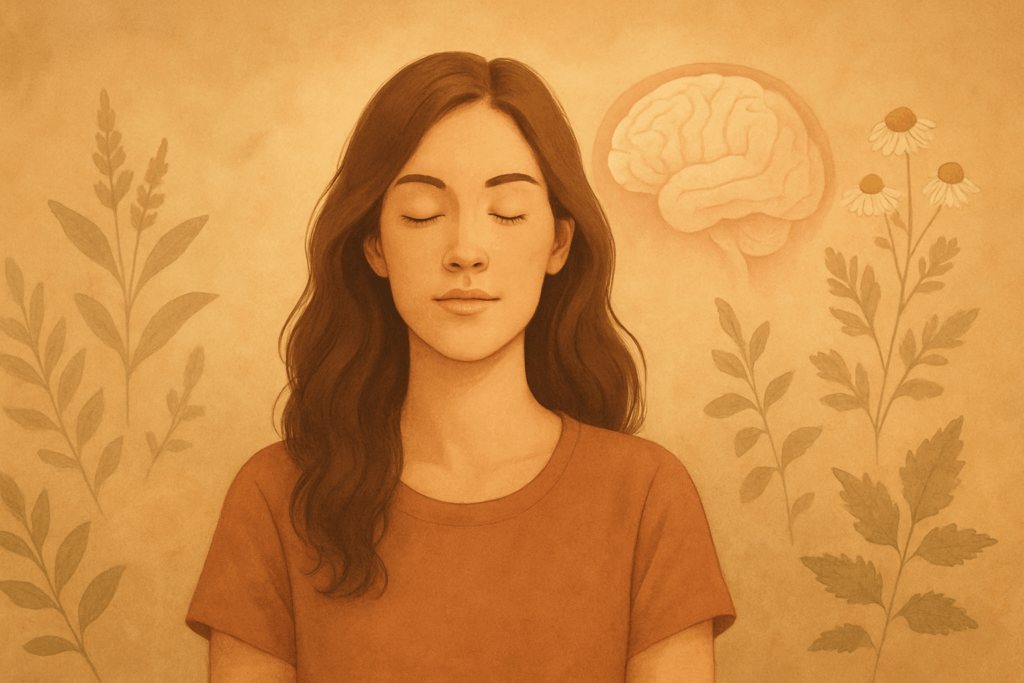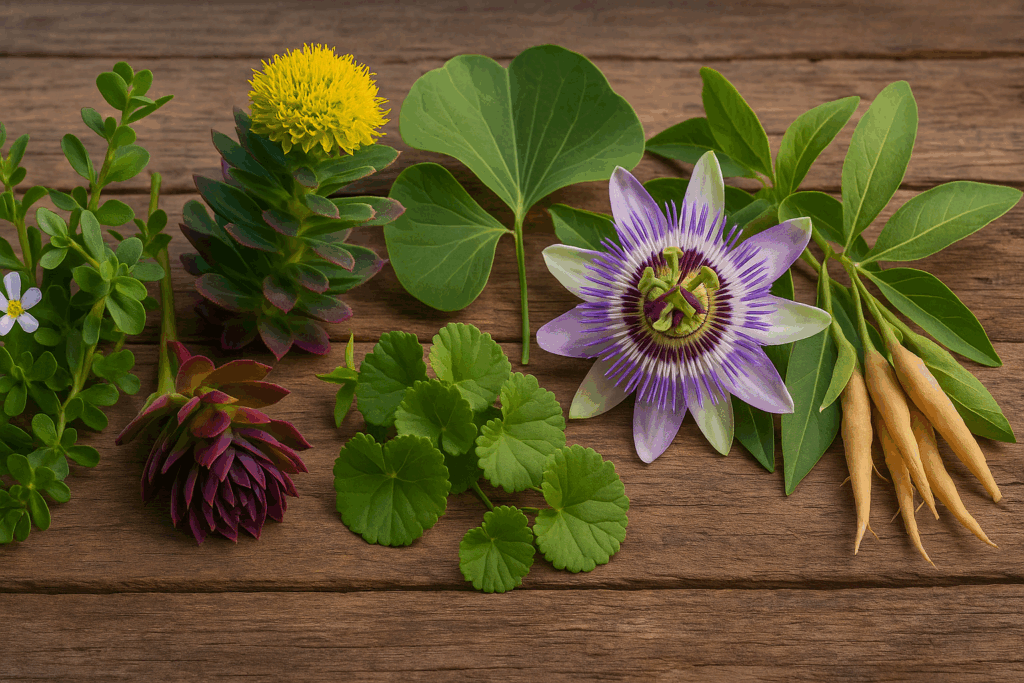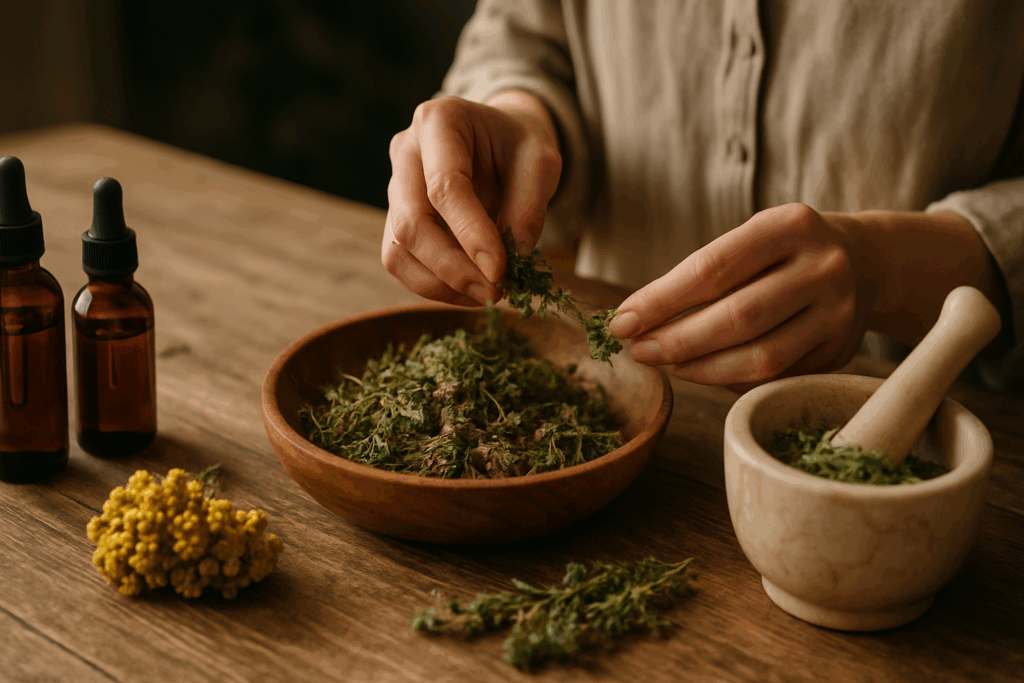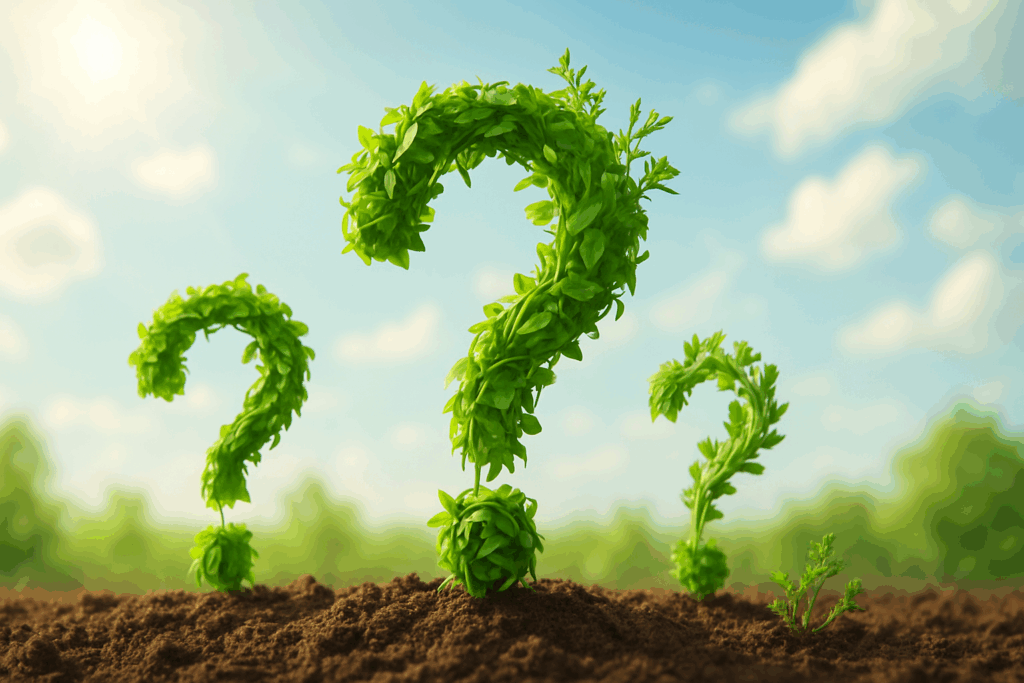Attention-deficit/hyperactivity disorder (ADHD) is increasingly recognized not only as a childhood condition but also as a complex, lifelong neurological difference that affects women in unique and sometimes underappreciated ways. Traditionally underdiagnosed in females, ADHD in women often presents with symptoms like inattention, emotional dysregulation, and internalized anxiety rather than the overt hyperactivity more commonly seen in males. As a result, many women seek natural approaches to support their focus, emotional balance, and cognitive performance. Herbal therapies are gaining traction as complementary options, providing a way to address symptoms without the side effects associated with pharmaceutical treatments. Understanding which herbs may offer real support—and why—requires a deeper dive into both traditional practices and modern scientific validation.
You may also like: Best Herb for ADHD Support: How Natural Remedies and Herbs for ADHD Women May Help Boost Focus and Calm
Understanding ADHD in Women: Why Herbal Support Matters
ADHD manifests differently in women compared to men, often leading to delayed diagnoses and misinterpretations of symptoms. Many women with ADHD struggle with executive function, emotional self-regulation, and chronic feelings of overwhelm. This complex interplay makes it vital to consider holistic interventions that address the entire nervous system. While prescription medications can offer tremendous relief, some women prefer, or complement these treatments with, botanical options. Herbal interventions can gently modulate neurotransmitter activity, reduce inflammation, and enhance cognitive resilience—factors that are crucial in managing ADHD symptoms naturally and sustainably.

Herbal interventions also appeal to those interested in broader wellness strategies, such as brain exercises to prevent dementia and cognitive training for dementia, which have shown how adaptable the brain remains across the lifespan. Herbs that promote neuroplasticity, calm the nervous system, and enhance neurotransmitter balance align well with a preventative, lifelong approach to brain health.
Key Criteria for Evaluating Herbs for ADHD
Choosing the best herb for ADHD support in women involves more than simply finding a “calming” plant. To be truly supportive, herbs must address specific facets of ADHD: enhancing executive function, modulating dopamine or norepinephrine pathways, reducing stress reactivity, and supporting emotional resilience. It’s also important to consider hormonal fluctuations unique to women, particularly during menstruation, pregnancy, and menopause, which can exacerbate ADHD symptoms. Therefore, a thoughtful selection of herbs must consider the holistic nature of both cognitive and hormonal dynamics.
Moreover, the best herbs should demonstrate evidence not only through traditional use but also through modern clinical studies. In the same way that brain exercises to prevent dementia are validated through scientific research, herbal approaches gain credibility when supported by well-designed studies. Thus, our exploration will favor herbs that bridge ancient wisdom and modern evidence, aligning with EEAT principles of experience, expertise, authority, and trustworthiness.

Top Herbs for ADHD Support in Women
Bacopa Monnieri: The Brain Tonic for Cognitive Clarity
Bacopa monnieri, commonly known as Brahmi, is revered in Ayurvedic medicine for its potent cognitive-enhancing properties. This adaptogenic herb has been extensively studied for its effects on memory, attention, and executive function. Clinical trials have shown that Bacopa improves information processing speed, memory recall, and learning ability, making it particularly beneficial for women with ADHD struggling with forgetfulness and disorganization. Furthermore, Bacopa has antioxidant properties that protect neurons from oxidative stress, a factor implicated in both ADHD and neurodegenerative diseases. By supporting the brain’s resilience, Bacopa parallels strategies such as cognitive training for dementia, illustrating how natural compounds can encourage neuroplasticity across the lifespan.
One particularly unique aspect of Bacopa is its ability to modulate acetylcholine, a neurotransmitter critical for learning and memory. Additionally, its calming effects on the nervous system help mitigate anxiety and restlessness, two common co-occurring symptoms in ADHD. This makes Bacopa not just a memory aid, but a holistic ally for overall cognitive and emotional balance.

Rhodiola Rosea: Boosting Focus and Resilience Under Stress
Rhodiola rosea, often called the “golden root,” is an adaptogenic herb celebrated for its ability to enhance resilience to physical and emotional stress. Research has demonstrated that Rhodiola can improve attention, stamina, and cognitive performance under fatigue—a critical consideration for women with ADHD who often face daily mental exhaustion. By modulating cortisol levels and supporting optimal neurotransmitter function, Rhodiola helps improve mood stability and focus without overstimulation.
Unlike stimulants that can exacerbate anxiety, Rhodiola’s balanced action on the stress response system makes it an ideal candidate for women needing sustained energy and clarity. Its neuroprotective effects also align with the principles behind brain exercises to prevent dementia, underscoring its potential to promote long-term cognitive health. Regular use of Rhodiola may therefore help not only with immediate symptom management but also with preserving brain vitality across decades.
Ginkgo Biloba: Enhancing Blood Flow and Cognitive Sharpness
Ginkgo biloba remains one of the most extensively studied botanical remedies for cognitive function. Known for improving cerebral blood flow, Ginkgo enhances oxygen and nutrient delivery to brain tissues, which is crucial for maintaining attention and memory. For women with ADHD, where mental fog and difficulty sustaining focus are persistent challenges, Ginkgo offers a valuable, natural boost.
Additionally, Ginkgo’s antioxidant effects protect against neuroinflammation, a process implicated in ADHD pathophysiology. Regular supplementation with Ginkgo has been associated with improvements in working memory and processing speed—outcomes that parallel the benefits seen with consistent cognitive training for dementia programs. Thus, Ginkgo not only aids immediate cognitive clarity but may also support the brain’s resilience over time.

Passionflower: Calming Emotional Turbulence
Passionflower (Passiflora incarnata) is traditionally used for its calming, anxiolytic effects, making it particularly relevant for women whose ADHD symptoms include emotional dysregulation, anxiety, and sleep disturbances. Passionflower appears to enhance gamma-aminobutyric acid (GABA) activity in the brain, promoting relaxation without sedation. This gentle modulation of the nervous system can create the internal environment necessary for better focus and emotional regulation.
Clinical studies have supported Passionflower’s role in reducing anxiety levels, improving sleep quality, and enhancing overall mood stability. By fostering emotional steadiness, Passionflower may indirectly improve executive functioning, thus enhancing the outcomes of brain exercises to prevent dementia by optimizing mental calmness needed for learning and memory tasks.
Gotu Kola: Supporting Neuroplasticity and Mental Clarity
Gotu Kola (Centella asiatica) is another time-honored herb revered for its brain-boosting properties. In traditional systems like Ayurveda and Traditional Chinese Medicine, Gotu Kola is celebrated for enhancing memory, promoting calmness, and supporting healthy circulation—traits that align closely with the needs of women managing ADHD.
Scientific studies indicate that Gotu Kola may increase brain-derived neurotrophic factor (BDNF), a protein essential for neuroplasticity and brain repair. This ability mirrors the goals of cognitive training for dementia, where fostering neuroplasticity is critical to maintaining brain function. Gotu Kola’s gentle yet profound effects make it a uniquely nurturing option for women seeking to sharpen their focus while cultivating long-term neurological resilience.
Ashwagandha: Balancing Hormones and Reducing Stress
Ashwagandha (Withania somnifera) is perhaps best known as a stress-reduction powerhouse. For women with ADHD, whose symptoms often flare during hormonal shifts or periods of intense stress, Ashwagandha’s adaptogenic properties offer profound support. Studies show that Ashwagandha can lower cortisol levels, enhance thyroid function, and stabilize mood—all essential factors in creating a balanced internal environment conducive to focus and productivity.
Ashwagandha’s potential neuroprotective effects also echo the benefits seen in brain exercises to prevent dementia. By reducing oxidative stress and supporting neuronal integrity, Ashwagandha provides a foundational layer of support that benefits both immediate cognitive function and long-term brain health.
Practical Considerations: Choosing and Using Herbs Wisely
When selecting herbs for ADHD support, quality matters immensely. Women should seek standardized extracts from reputable brands that verify potency and purity through third-party testing. It is also important to remember that herbal therapies work best when integrated into a holistic strategy that includes nutrition, exercise, mindfulness practices, and, where appropriate, professional cognitive training for dementia prevention or cognitive enhancement.
Moreover, individual responses to herbs can vary significantly. Women should work with healthcare providers knowledgeable in both conventional and integrative medicine to tailor an herbal approach suited to their unique biochemistry, symptom profile, and lifestyle. This personalized strategy ensures that the benefits of herbal therapies are maximized while minimizing the risk of side effects or interactions with medications.
The Importance of Lifestyle in Supporting Herbal Therapies
Herbs are most effective when complemented by a lifestyle that supports brain health. Regular aerobic exercise, mindfulness meditation, and structured routines can help solidify cognitive improvements. Engaging in brain exercises to prevent dementia, even at a young age, strengthens the same executive functions—such as working memory and flexible thinking—that herbs like Bacopa and Gotu Kola aim to support. Cognitive training for dementia, even among healthy adults, has been shown to enhance neural connectivity, suggesting that proactive brain care pays dividends well before symptoms of decline appear.
Diet also plays a crucial role. Nutrient-dense foods that support neurotransmitter synthesis—such as leafy greens, fatty fish, and berries—can synergize with herbal therapies to create a robust foundation for mental clarity and emotional balance. Hydration, adequate sleep, and stress management techniques round out a comprehensive strategy for optimizing the effects of natural interventions.
Potential Precautions and When to Seek Professional Guidance
While herbs offer profound support, they are not a replacement for individualized medical care. Women with ADHD should consult healthcare professionals, especially when considering herbal therapies alongside prescription medications. Certain herbs, like Ginkgo biloba, can interact with blood thinners, and others may not be advisable during pregnancy or while breastfeeding.
Moreover, underlying medical conditions such as thyroid disorders, hormonal imbalances, or nutritional deficiencies can mimic or exacerbate ADHD symptoms. Proper evaluation ensures that any herbal strategy is built on a foundation of accurate diagnosis and comprehensive care, rather than an assumption of ADHD where another condition may be driving symptoms.

Frequently Asked Questions (FAQ) on Herbs for ADHD Support in Women
1. How can herbal remedies complement traditional ADHD treatments in women?
Herbal remedies offer a complementary path alongside traditional ADHD treatments by targeting underlying stress, inflammation, and cognitive dysregulation. Many women find that adding herbs helps stabilize mood swings and supports attention during hormonal fluctuations. Incorporating brain exercises to prevent dementia alongside herbal supplementation can further enhance neuroplasticity and executive function. Cognitive training for dementia has shown that targeted brain activities can significantly improve processing speed, and herbs may prime the brain for greater adaptability. Together, these natural supports create a more resilient cognitive environment without replacing professional medical care.
2. Are there specific herbs that pair well with brain exercises to prevent dementia for women with ADHD?
Yes, certain herbs work synergistically with brain exercises to prevent dementia, especially for women managing ADHD symptoms. For example, Bacopa monnieri enhances memory retention, making it easier to benefit from cognitive drills. Rhodiola rosea improves mental stamina, supporting longer and more effective practice sessions. Research in cognitive training for dementia suggests that when neuroprotective herbs are combined with brain activities, the brain’s adaptive capacity improves exponentially. Therefore, combining targeted herbals with structured cognitive routines offers a strategic and layered approach to brain health.
3. How does cognitive training for dementia relate to improving focus in women with ADHD?
Cognitive training for dementia focuses on strengthening neural pathways involved in memory, attention, and problem-solving—the same domains often impaired in ADHD. Women with ADHD can harness similar training techniques to sharpen their executive functioning, such as working memory and flexible thinking. When supported by nootropic herbs like Ginkgo biloba or Gotu Kola, the gains from cognitive exercises can become even more pronounced. Engaging in brain exercises to prevent dementia early in life can serve not only as prevention but also as a practical method for improving daily attention and mental resilience. It is a proactive way to address cognitive symptoms from multiple angles simultaneously.
4. Are there emerging herbal blends designed specifically for women with ADHD?
Yes, emerging formulations now combine herbs like Bacopa, Ashwagandha, and Passionflower tailored specifically for women’s cognitive and hormonal needs. These blends often target both executive dysfunction and emotional regulation. Some also integrate botanicals shown to support long-term brain vitality, aligning with findings from brain exercises to prevent dementia research. Formulators are beginning to appreciate that women’s cognitive needs fluctuate across the menstrual cycle and are crafting adaptive solutions. In tandem with cognitive training for dementia strategies, these innovative herbal combinations aim to offer truly comprehensive mental support.
5. Can using herbs prevent the cognitive decline associated with aging for women diagnosed with ADHD?
While herbs cannot “guarantee” prevention, they can significantly support brain health and resilience over time. Herbs like Gotu Kola and Rhodiola have been studied for their neuroprotective properties, which align with strategies employed in brain exercises to prevent dementia. Integrating these herbs into a proactive lifestyle that includes cognitive training for dementia helps create a neuroprotective environment. This dual strategy may not only address present ADHD symptoms but also guard against future cognitive decline. Early intervention remains key, making herbal support an important pillar of lifelong brain wellness planning.
6. How do lifestyle factors interact with herbal ADHD support strategies?
Lifestyle factors such as nutrition, sleep hygiene, exercise, and stress management significantly influence the effectiveness of herbal ADHD interventions. A nutrient-rich diet, for example, can amplify the neurochemical balance that herbs seek to support. Regular aerobic exercise complements brain exercises to prevent dementia by promoting brain-derived neurotrophic factor (BDNF) production, which is vital for neuroplasticity. Cognitive training for dementia also becomes more effective when the nervous system is well-nourished and stress levels are controlled. In this holistic context, herbs act as amplifiers rather than sole solutions, highlighting the importance of comprehensive wellness planning.
7. How long does it typically take to notice improvements with herbal therapies for ADHD?
Herbal therapies usually require consistent use over several weeks to months before noticeable benefits appear. For instance, Bacopa monnieri often takes eight to twelve weeks to fully manifest its cognitive benefits. Women engaging simultaneously in brain exercises to prevent dementia may find that herbs accelerate their ability to integrate new learning and focus strategies. When paired with cognitive training for dementia, the cumulative effect of herbal support and targeted mental stimulation can become evident earlier. Patience and consistency are essential to unlocking the full synergistic potential of these natural approaches.
8. Are there risks associated with long-term herbal use for cognitive support in women?
While most herbs are safe when used appropriately, long-term use can occasionally pose risks, especially without professional supervision. For example, Ginkgo biloba may increase bleeding risk in some individuals, particularly if combined with blood-thinning medications. That’s why layering brain exercises to prevent dementia and cognitive training for dementia with herbal approaches should be monitored carefully to ensure all elements complement rather than conflict with one another. Regular consultations with a knowledgeable healthcare provider ensure that women benefit safely from long-term herbal cognitive support. Personalization and ongoing evaluation are crucial for sustainable, risk-mitigated outcomes.
**9. Can herbs replace cognitive training methods for managing ADHD symptoms?
Herbs cannot replace cognitive training methods but can significantly enhance their effectiveness. Botanical supplements like Rhodiola and Gotu Kola prepare the brain to better adapt to the challenges of structured learning exercises. Brain exercises to prevent dementia and cognitive training for dementia have shown that targeted repetition and strategic engagement are essential for strengthening cognitive abilities. Herbs offer a supportive backdrop, enhancing mood, focus, and neural resilience, but structured cognitive effort remains irreplaceable. In the most effective programs, both herbal support and cognitive training are integrated, maximizing overall brain performance.
10. What future developments are expected in herbal treatments and cognitive training for ADHD?
The future of ADHD management for women is leaning heavily toward integrative models combining herbal pharmacology with personalized cognitive training systems. Advances in neurofeedback, AI-driven brain exercises to prevent dementia, and enhanced herbal extraction methods are already reshaping the landscape. Research into cognitive training for dementia is uncovering ever more sophisticated strategies for neuroplasticity, many of which could be adapted for ADHD interventions. Additionally, emerging genomics research may soon allow for the personalization of herbal blends based on individual neurotransmitter profiles. This highly customized future holds the promise of targeted, highly effective, and side-effect-minimized support strategies for women with ADHD.

Conclusion: Empowering Women with Natural Strategies for ADHD Support
Exploring the best herb for ADHD support in women opens a pathway toward more personalized, sustainable, and holistic health strategies. Bacopa monnieri, Rhodiola rosea, Ginkgo biloba, Passionflower, Gotu Kola, and Ashwagandha each offer unique gifts—ranging from cognitive enhancement to emotional regulation—that can help women thrive amid the challenges of ADHD. These botanicals, especially when used in conjunction with lifestyle strategies like brain exercises to prevent dementia and cognitive training for dementia, empower women to take an active role in nurturing their neurological health.
Incorporating herbal allies thoughtfully, backed by science and personalized care, offers a promising and enriching approach to managing ADHD naturally. By valuing the interplay between mind, body, and spirit, women can cultivate resilience, focus, and emotional harmony, ensuring that their journeys with ADHD are marked not by limitation, but by empowered, vibrant living.


